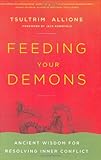I too found that changing my diet and exercising helped.
One of the most effective methods for me is meditation.
Ironically, during meditation, you also accept the anxiety. Or to be precise, you accept the experience of anxiety. The thing is, I also know that all things are transient. That includes anxiety. If you mindfully observe anxiety as it arises, you can literally see it created, come into full force ... and then start fading away.
When the mind starts avoiding the experience of anxiety, it tends to get stronger. Further, the avoidance itself triggers secondary waves of anxiety, so you enter this feedback loop of anxiety.
Ultimately, anxiety is the feeling of avoidance. If you've gained the skill where you direct your awareness at the anxiety itself, you start being able to see things more clearly.
You can learn about this through http://www.urbandharma.org/udharma4/mpe.html or participating in a Vipassana retreat.
There is also the method described by this book: http://www.amazon.com/Feeding-Your-Demons-Resolving-Conflict...
There are also carefully conducted entheogen sessions that can help treat this.


Another practice I did for a while to really start examining intense, often unpleasant emotions within myself and others is this: http://www.amazon.com/Feeding-Your-Demons-Resolving-Conflict...
At the end of the day, someone's suffering is their own. By "suffering" I am really talking about dukkha, the Sanskrit word better translated as existential anguish. This is something every person has. It is only when one can clearly see it that they can allow space for someone to work through it. By "witnessing", I am talking about something like practicing vipassana while in the presence of someone suffering. And believe me, that is not as easy as it sounds, neither for the practitioner, or for the person in deep suffering.